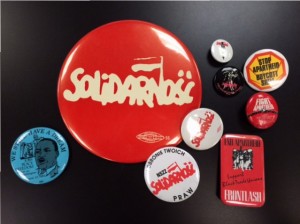New Exhibit: Civil Rights and Labor…in the United States, in Poland, and in South Africa
Labor unions have long been advocates for equality in the workplace, civil rights and worker’s rights, however this wasn’t always the case before the AFL and CIO merged in 1955. Understanding civil rights is still evolving today, as we see in current events in the United States and around the world. The records of the AFL-CIO are a treasure trove, rich with a variety of materials available for research on this. The University of Maryland is the official repository of the AFL-CIO records. Find out more about all of our labor collections here.
The Civil Rights Movement in the United States
The exhibit highlights the overlapping interests in equal rights, between the AFL-CIO Civil Rights Department and leaders of the Civil Rights Movement. In 1961, Martin Luther King, Jr, spoke at the AFL-CIO Convention, and in the same year George Meany sent a telegram to King lauding King’s contributions to advance the cause of equality for all citizens, a goal AFL-CIO fully supported, and went on to say:
“It is not mere coincidence that where civil rights are most strongly suppressed, unions are most vigorously opposed. Nor is it coincidence that where negroes exist under miserable social and economic conditions, wages are lowest for all workers, social legislation least advanced and anti-labor legislation most severe.”
The Civil Rights Act of 1964 was strongly supported by Martin Luther King, Jr., George Meany, and President Lyndon Johnson. And, when King was assassinated, many national and international labor unions poured out telegrams to the AFL-CIO, and a number of press releases were written by AFL-CIO in response to the assassination of Martin Luther King, Jr. On the night of King’s death April 4, 1968, Meany sent out a press release stating that the “murder of Dr. Martin Luther King is an American tragedy.”
Our collections also include some information about The March on Washington led by Martin Luther King, Jr. on August 28, 1963. The March was not fully sponsored by the AFL-CIO because of internal conflicts about civil rights.
 Apartheid in South Africa
Apartheid in South Africa
The AFL-CIO’s allied African American Labor Center was involved with the anti-apartheid movement responding to multiple civil and worker’s rights violations in South Africa, however the AFL-CIO did not fully engage until later because of the communist leadership in the anti-apartheid movement. In 1986, the AFL-CIO participated in a global boycott of Shell Oil Company.
Solidarnosc in Poland
The Polish Solidarnosc movement was strongly supported by AFL-CIO President, Lane Kirkland in the 1980s. The AFL-CIO International Affairs Department sent monthly contributions of $500 to support the underground union organizers in Poland. The AFL even sent CARE packages to Poland in 1949 and received handwritten letters of thanks from Polish citizens.
Our labor collections are comprised of AFL-CIO Department records, trade department records, international union records, union programs, union organizations with allied or affiliate relationships with the AFL-CIO, and personal papers of union leaders. We also have extensive photo documentation of labor union activities from the 1940s to the present in the photographic negative and digital collections. Additionally, collections of graphic images, over 10,000 audio tapes, several hundred films and videotapes, and over 2,000 artifacts are available for research and study.
Find out more about all of our labor collections here, or contact a curator for more information!



Pingback: Labor History Wikipedia Edit-a-thon | Special Collections at the University of Maryland